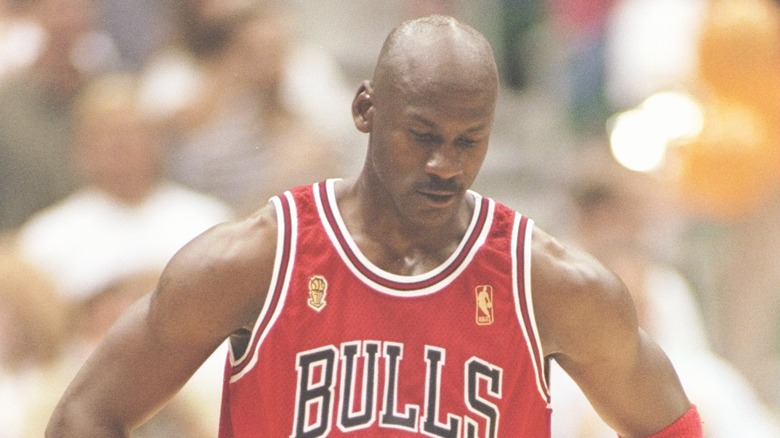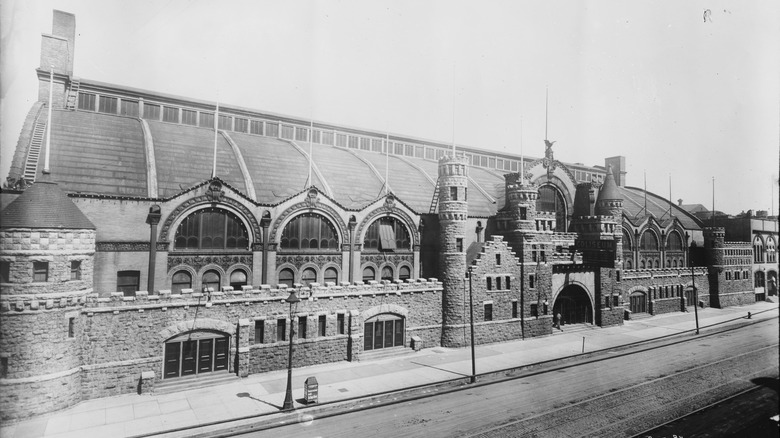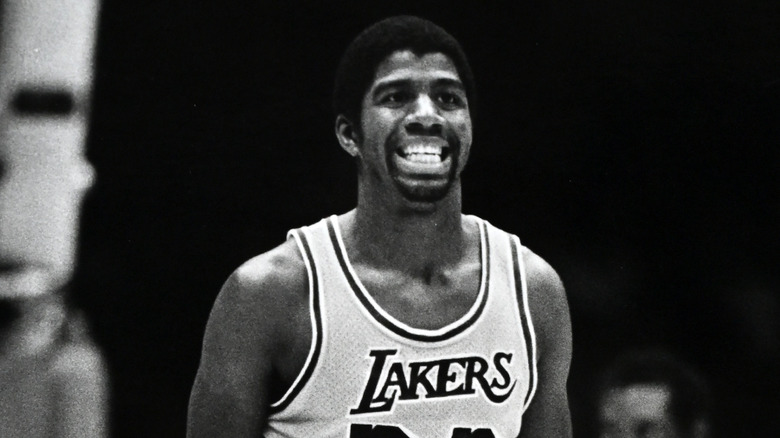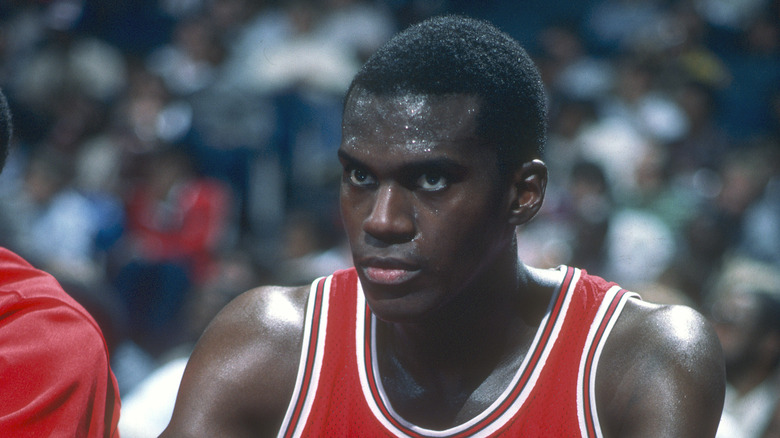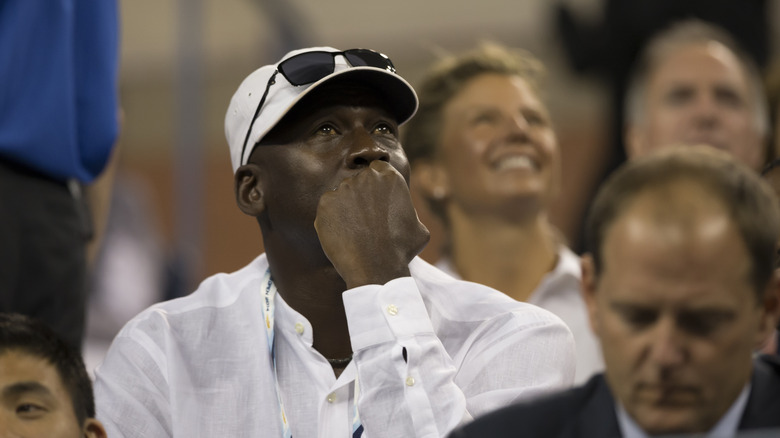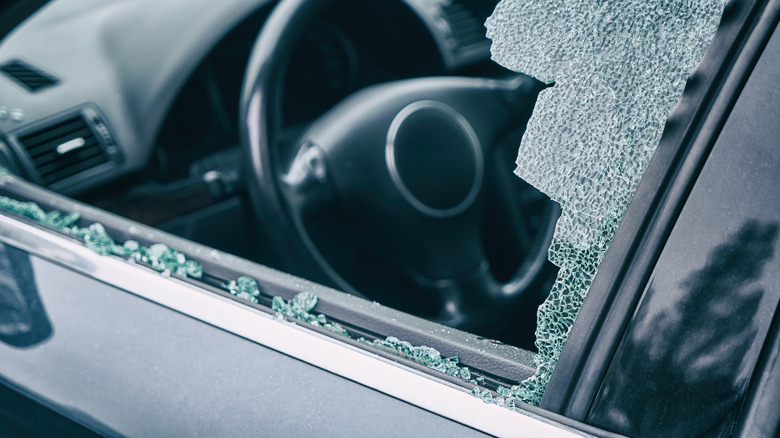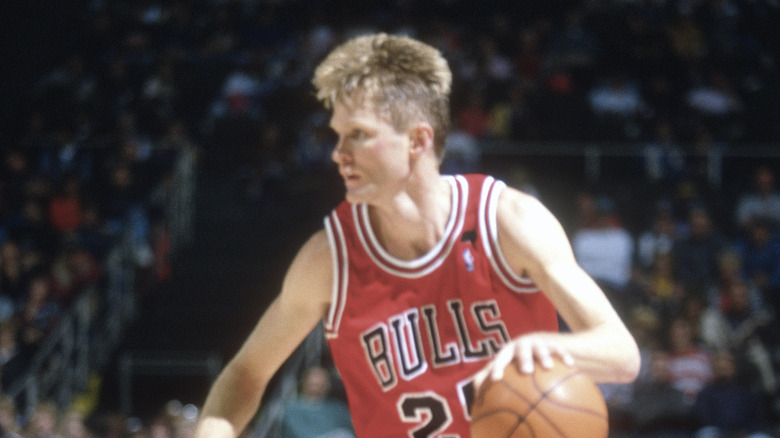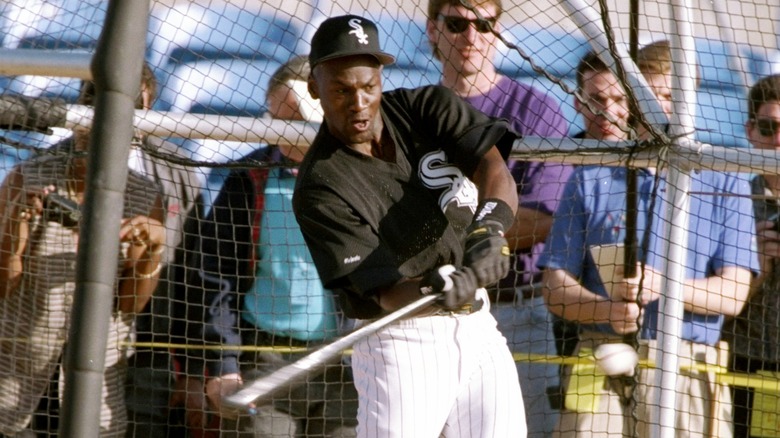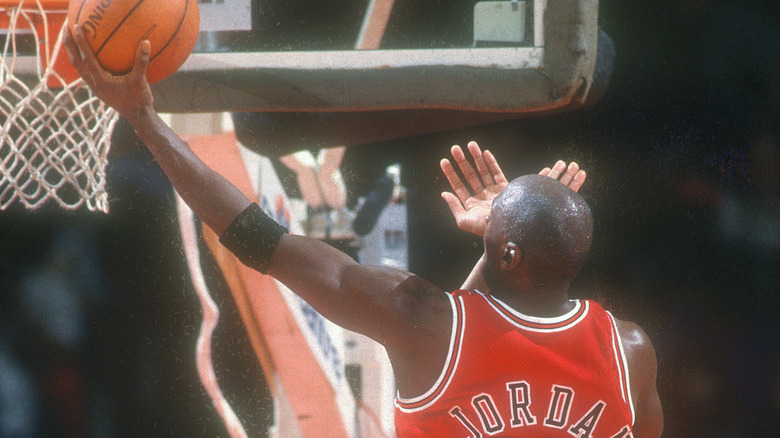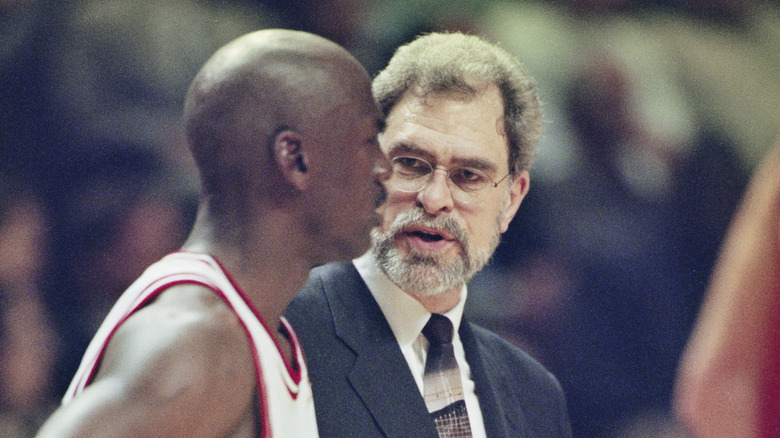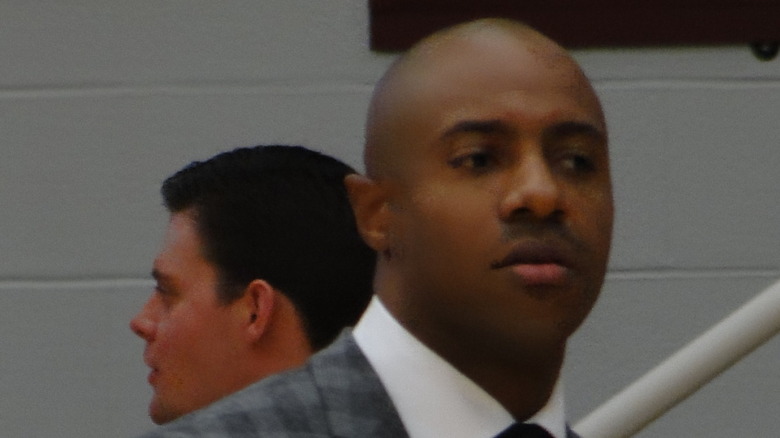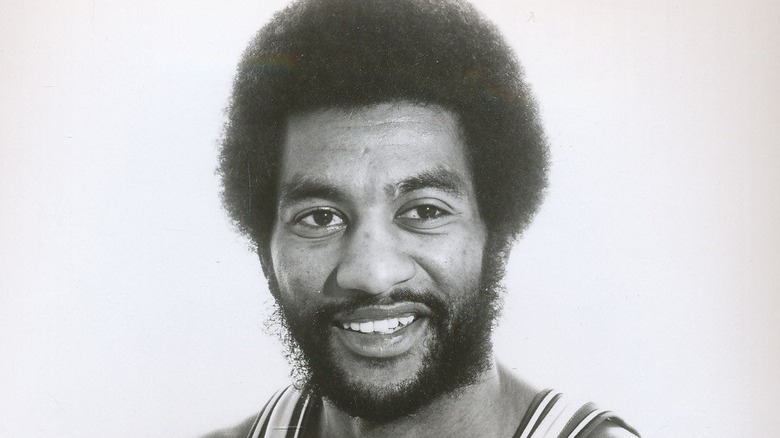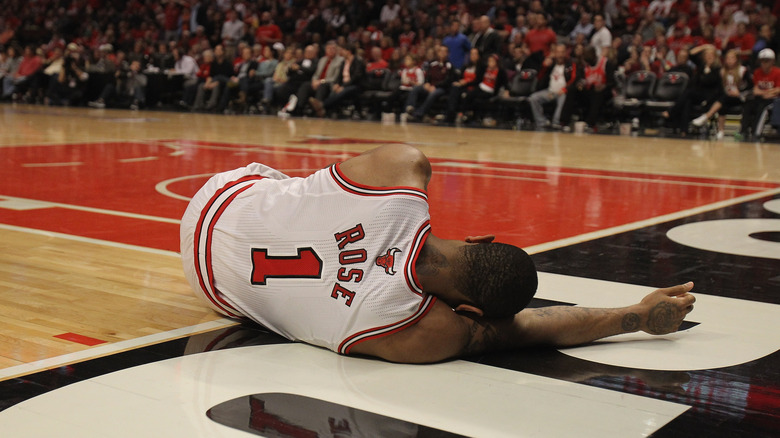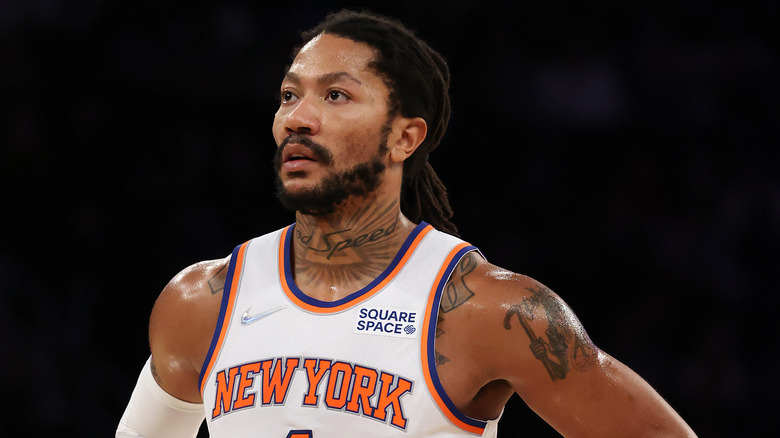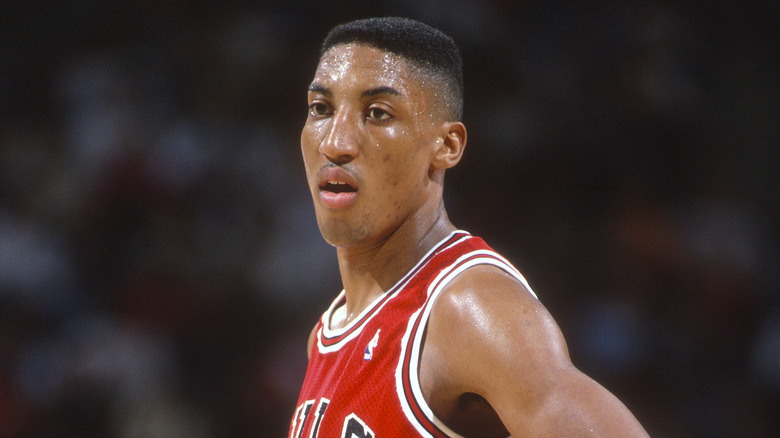The Tragic Real-Life History Of The Chicago Bulls
There are not many teams in sports history that can claim to have the greatest player of all time. The Chicago Bulls are one of those teams, and most of those who have been lucky enough to see Michael Jordan play will agree with that assessment. With the man that many call the GOAT, that franchise managed to pull off a nearly impossible achievement for the time: six championships in less than 10 years.
Yet even with their incredible players and accomplishments, the Bulls and their loyal fans have endured much pain and sorrow over the 50+ years of the team's existence. Long spans were rough for many involved with the franchise, so the titles were all the more important for a team with plenty of open wounds and scars. For outsiders looking in, the Bulls are not commonly feared, nor do people jealously view them as dominant victors. Yet, the Chicago franchise has endured fierce trials and is respected for what they have overcome.
Difficult start for Chicago franchises
In the early days of professional basketball, the sport had a disastrous start in Chicago. More than one franchise failed to establish themselves in the city, and it got so bad that Bull's historian Roland Lazenby says, "Chicago was considered a graveyard for pro basketball" (via Reader). First off, the Stags of the Basketball Association of America, a predecessor of the NBA, somehow managed to survive four seasons before collapsing. Another failed attempt was made by a team amusingly known as the Packers before they changed their name to the Zephyrs and left for Baltimore.
It is no surprise that the city was rather unenthusiastic when the Bulls entered the fray in 1966, as the inaugural parade for the new team also failed to impress many Chicagoans. The franchise then exceeded the expectations of most during its debut season and even managed to make the playoffs. However, the achievement was not impressive enough for their home court, the International Amphitheater, which kicked the Bulls out in order to host more profitable trade shows instead. For their one home playoff game, the team was forced to play at an older venue, the Chicago Coliseum.
Missing out on Magic Johnson
A major moment in basketball history occurred in 1979 that determined the futures of two NBA teams, the Bulls and the Los Angeles Lakers. At the time, a coin flip was the deciding factor for which of these two worst teams in the league would get the first pick, instead of the draft lottery that was instituted years later, according to Bleacher Report.
It was impossible to know how great of a player he would become, but on the line was the chance to secure Earvin "Magic" Johnson. Fortune once again did not favor the Bulls, who lost the chance for the critical first choice. That privilege instead went to the winner of the toss, so the future all-star ended up playing in Los Angeles.
An optimistic perspective would be that missing out on Johnson meant the Bulls could later sign Michael Jordan in 1984. But whether that's true or not, it must have been hard for Chicago fans to witness a player of such talent who came so close to becoming a Bull in an era when the franchise had not yet won a championship.
The team's issues with drugs
In the late 1970s to early 1980s, drug use was not just a problem for the Bulls but was a major issue across the entire league. It got so bad that by 1980 that there may have been as much as 40 to 75% of the players regularly using cocaine. To combat the issue, the NBA implemented a drug policy in 1984, however, it did little to deter the Bulls players of the time. As author Roland Lazenby said about the team (via Reader), "There was a strong feeling that things went better with coke."
It was later that same year when the franchise's future best player would join the team as a rookie. In his book "Michael Jordan: The Life," Lazenby describes the situation that, "Jordan would now be working with an array of cynical castoffs and casualties, some of them deeply troubled by cocaine and alcohol abuse." The player himself always claimed that he never took part in the illicit festivities, so he gave the team that year the nickname of the "Looney Tunes."
Aside from Jordan, none of those players remained on the team longer than two years later. And for two of the players especially, the drug culture led them down a very dark path. Guard Quintin Dailey went to drug rehab twice and after forward Orlando Woolridge left the Bulls to join the New Jersey Nets in 1986, he faced a suspension for substance abuse in his second season there. In the end, their tragic struggles persisted until they led to their early deaths.
Michael Jordan's gambling problem
As one of, if not, the greatest basketball player of all time, Michael Jordan brought considerable joy to the fans and the city in general when he won the Chicago Bulls' first six championships. Unfortunately, the superb athlete also endured much sorrow and personal struggle in these early years. Jordan may have said no to drugs, but his gambling vice became a concern for the NBA in 1992.
When paperwork was recovered from thieves who murdered a bail bondsman, there were checks for a huge gambling debt of $108,000 linked to Jordan. NBA officials, including Commissioner David Stern, then met with the player and ultimately decided that he had not violated the league's rules. However, Jordan's troubles did not end there, as later that year he testified in the money laundering case of a drug dealer he lost $57,000 to, says Sam Smith in his book, "The Jordan Rules: The Inside Story of Michael Jordan and the Chicago Bulls."
Both incidents did not deter Jordan from his bad habit. The player was even seen gambling until 2:30 AM in Atlantic City before the second game in the Eastern Conference Finals in 1993. But the NBA did not look into the issue again until San Diego golf pro Richard Esquinas claimed that Jordan owed him $1.25 million. After an investigation, the league found the superstar not guilty of any wrongdoing, yet major cracks had formed in his public image that was nearly untarnished just a couple of years before.
The murder of Michael Jordan's dad
The same year that M.J. faced his second gambling investigation from the league, he was struck by a tragedy that was far more devastating than anything involving his addiction. In July, James Jordan, Michael's father, traveled to Wilmington, North Carolina for the funeral of a friend. After no one had heard from him over a week later, his family became alarmed, because he usually checked in while traveling. Michael then feared the worst when his father's damaged Lexus was discovered with no sign of him, since he knew how much James loved that car.
Not long after, the family was horrified to discover their nightmare was real. On the return drive home from his trip, James had pulled over on the side of the road to get some rest when two young men approached the car and murdered him, according to David Halberstam in his book, "Playing for Keeps: Michael Jordan and the World He Made." The killers then stole the vehicle, dumped the body, and vandalized the car before discarding it.
James was not just a father to Michael, but also one of his closest friends, so he was deeply wounded by the loss.
The assassination of Steve Kerr's father
Nearly a decade before the murder of James Jordan, another major player on the championship-winning Bulls team had also experienced the sudden, tragic loss of his father. In 1984, Steve Kerr's dad, Malcolm Kerr, was working as the president of the American University of Beirut in Lebanon when he was assassinated, as revealed in the documentary, "The Last Dance" (via Esquire).
The horrific shooting not only deeply affected the future pro athlete, but it also received significant national attention and even was addressed by President Ronald Reagan, since it was a possible terroristic attack aimed at the United States. Years later, Kerr and Michael Jordon created a strong bond while they played together and had much respect for one another. However, when Kerr was asked about the similar tragedies they experienced, he said, "We never discussed that. I think it was probably too painful for each of us."
Michael Jordan's first retirement
After winning the Bulls' first three championships, Jordan made the shocking announcement that he was retiring from basketball while still in his prime. The move made no sense given his achievements on the court. However, the turmoil of his private life was most likely the cause. According to Reader, the star player made the decision public less than three months after the death of his father and two days before he was cleared by NBA officials regarding his gambling. The reason M.J. gave was, "I have nothing more to prove in basketball."
Jordan then went on to make a failed attempt at a professional baseball career playing for the Chicago White Sox's AA team, the Birmingham Barons, because of the love he and his father both had for the sport. Yet unlike his near-perfect performances on the court, he was much more prone to making mistakes on the field. Meanwhile, without their best player, the Bulls were unable to continue their streak and win the championship again in 1994.
Chicago riots after 90's championships
After his temporary retirement from basketball, Michael Jordan returned to the Bulls and, incredibly, won another three championships with the team. The six NBA titles brought ecstatic celebrations to the streets of Chicago, though unfortunately, much darkness clouded the jubilations. After every league victory, there was a considerable amount of property damage and looting. In 1993 and 1997, the chaos led to the deaths of three people and two deaths from gunshot wounds, respectively, according to the Las Vegas Sun.
The riot after the 1992 championship was the worst of all, with 100 people injured, 61 police cars damaged, arson, looting, and various kinds of property destruction leading to over 1,000 arrests. Yet, as the titles increased, the amount of violence began to decrease. By 1997, the arrests were down to 579 and were mostly for minor offenses. For the last championship in 1998, the police were the most prepared and repressed much of the chaos.
Abrupt end of the Jordan era
After winning their sixth championship, the Bulls dynasty immediately crumbled as Michael Jordan, Scottie Pippin, and coach Phil Jackson all left the team. Author Roland Lazenby describes the rapid collapse thusly: "It was not just ugly, it was sad. The city loved that team so much" (via Reader). Most blamed GM Jerry Krause for the sudden departures; however, the entire franchise had gone rotten from the inside, as Lazenby says it had become an "ugly mound of puss and ego and finger-pointing and bad blood."
In the years after, the team lost a lot, like most of their games. The 2000-2001 season was the worst in the team's history, and the next coach was already gone the following season. The circumstances did not improve for much of the decade, for it took until 2005 for the Bulls to finally qualify for the playoffs again.
Jay Williams' motorcycle crash
The situation began to look a little better for the Bulls in 2002 when they secured the second draft pick, Jay Williams, and many expected a great season from their star rookie. There was so much hope in the new player that a ceremony took place in which Williams was presented with Michael Jordan's old locker. Sadly, it was not meant to be, for there was nothing special about his first season and tragedy struck the rookie shortly afterward in 2003.
When riding his motorcycle in Wicker Park, Williams smashed into a light pole. The collection of career-ending injuries included severing an artery in his leg and damaged nerves, along with the dislocation of his pelvis and left knee. In his book, "Life Is Not an Accident: A Memoir of Reinvention," Williams recalled the heartbreaking moment immediately after the crash when he realized he would no longer be a pro athlete. As he lay on the ground, he remembers pounding the grass with his fist and screaming, "I threw it all away! I threw it all away! I threw it all away!" (via ABC News). Thankfully, Williams lived, he but was right that his career was over.
Announcers died on the same day
One of the saddest days in Bulls history occurred on February 25, 2009, when two prominent figures of the franchise passed away within 24 hours of each other. First, fans were shocked by the news that 62-year-old Norm Van Lier, announcer and former star player from the '70s, was found dead in his home that afternoon, according to ESPN. Then, just a few hours later, the team's first coach and major broadcaster, Johnny "Red" Kerr, succumbed to his difficult fight with prostate cancer.
Although still devastating, Kerr's death was less of a shock, as many had witnessed his poor condition in a wheelchair weeks before at his tribute on February 10. On the other hand, Van Lier had worked a few days before his death, so to many, it seemed to come out of nowhere. However, Van Lier's wife Susan set the record straight, explaining, "I know it was really shocking to everyone else, but not to his family. He was in and out of the hospital a lot over the past five years. He was pretty ill during that time, but he didn't want people to know. He would actually conduct his business from his hospital bed as if he was not in the hospital."
Derrick Rose' successive injuries
The tide had finally begun to turn for the Bulls, especially after the arrival of Derrick Rose in 2008. In the 2010-2011 season, the team's new star had become so good that he was the youngest to ever win the MVP award. Yet before the young player could get the team closer to the glory days of the Jordan era, a terrible injury shattered any future aspirations.
In 2012, during game one of the first-round series, Rose tore his ACL. Without Rose, the team was not on the same level, as Luol Deng told NBC Sports, "If the injury didn't take place, we were on our way [to a championship]."
Not only did the Bulls miss out on the title that year, but Rose's condition was so bad that he was forced to miss the following 2012-2013 season as well. He then heartbreakingly tore his meniscus the next year, and then again in 2015. The tragic series of injuries did not ruin his basketball career, but it did end his time with the Bulls, to the despair of many fans who dreamed of what could have been.
Derrick Rose leaving the Bulls
Since Derrick Rose grew up in Chicago, he had a very strong fanbase in the city. When he was once asked by a fan what it felt like to play in his hometown, Rose responded, "Greatest thing ever happened to me. This is the greatest city in the world" (via USA Today). So, it was extra heartbreaking for many Chicagoans when he left the Bulls to join the New York Knicks in 2016. But by that time, the pro had been plagued by so many injuries that he was no longer the player he once was, and it was best for both him and the team to get a fresh start.
Chicago Bulls Chairman Jerry Reinsdorf gave a touching statement regarding the departure and said, "Knowing Derrick as I do makes this trade a hard one. Everyone knows him as the local kid who became MVP for his hometown team, but not everyone got to know him like I did. While he is a terrific basketball player, he is an even better person with a tremendous heart. I wish him the best of health for the remainder of his career, and I want to personally thank him for everything that he did on the court and in the community during his time with the Chicago Bulls."
Death of Scottie Pippin's son
Second only to Michael Jordan, Scottie Pippin was an essential part of the Bulls team that won six championships. In 2021, the retired star was devastated by the loss of his son, Antron Pippin, at the young age of 33. Even though the knowledge was public that Antron had a medical condition, the cause of his death was never announced.
In a moving statement, Pippin said, "I'm heartbroken to share that yesterday, I said goodbye to my firstborn son Antron. The two of us shared a love for basketball and we had countless conversations about the game. Antron suffered from chronic asthma and if he hadn't had it, I truly believe he would've made it to the NBA. He never let that get him down, though—Antron stayed positive and worked hard, and I am so proud of the man that he became" (via WGN).
